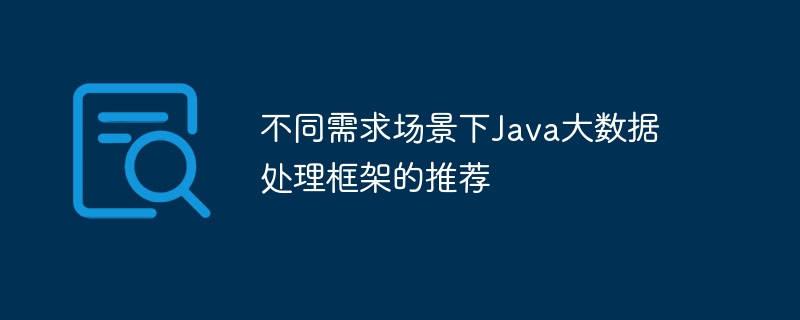Home >Java >javaTutorial >Recommendations for Java big data processing frameworks under different demand scenarios
Recommendations for Java big data processing frameworks under different demand scenarios
- WBOYWBOYWBOYWBOYWBOYWBOYWBOYWBOYWBOYWBOYWBOYWBOYWBOriginal
- 2024-04-20 11:30:02670browse
Recommended Java big data processing framework under different needs: Massive offline batch processing: Apache Hadoop (HDFS, MapReduce) Fast memory processing: Apache Spark (stream processing, interactive query) Low-latency stream processing: Apache Flink (event-triggered computing) , high throughput) data stream transmission: Apache Kafka (high throughput, low latency)

Recommendations for Java big data processing framework under different demand scenarios
The Java language and its rich ecosystem have always been the tool of choice for building big data applications. Many big data processing frameworks are built based on the Java ecosystem, providing different solutions for different demand scenarios. This article will discuss the most commonly used Java big data processing frameworks and their applicable scenarios, and illustrate them through practical cases.
1. Apache Hadoop
Hadoop is a distributed computing framework used to process massive amounts of data. It provides distributed storage (HDFS) and data processing (MapReduce) capabilities. Hadoop is a good choice when the amount of data is very large and offline batch processing is required.
Application scenarios:
- Log analysis
- Data warehouse loading
- Data mining
2. Apache Spark
Spark is a unified analytics engine that provides in-memory and distributed computing for fast data processing. It is more flexible and easier to use than Hadoop, and supports multiple data processing modes such as stream processing and interactive queries.
Application scenarios:
- Real-time analysis
- Machine learning
- Graphics processing
3. Apache Flink
Flink is a stream processing engine that can process continuous data streams with low latency. It supports streaming and batch processing, and provides higher throughput and real-time response through event-triggered calculations.
Application scenarios:
- IoT data processing
- Event stream analysis
- Fraud detection
4. Apache Kafka
Kafka is a distributed messaging system that provides high throughput and low latency data streaming. It is often used to ingest data from different applications or systems into other big data processing systems.
Application scenarios:
- Log collection
- Message delivery
- Event notification
Case study:
E-commerce websites need to conduct data analysis on user behavior. The amount of data is large and requires offline batch processing. Therefore, Hadoop is a suitable solution.
Implementation:
- Use HDFS to store user behavior data
- Use MapReduce to summarize and analyze data
- Use Hive for interactive querying and data visualization
Conclusion:
Choosing the right Java big data processing framework is crucial as it determines the performance of the application Performance, scalability and ease of use. By understanding the benefits and use cases of different frameworks, developers can make informed decisions to meet their specific needs.
The above is the detailed content of Recommendations for Java big data processing frameworks under different demand scenarios. For more information, please follow other related articles on the PHP Chinese website!

